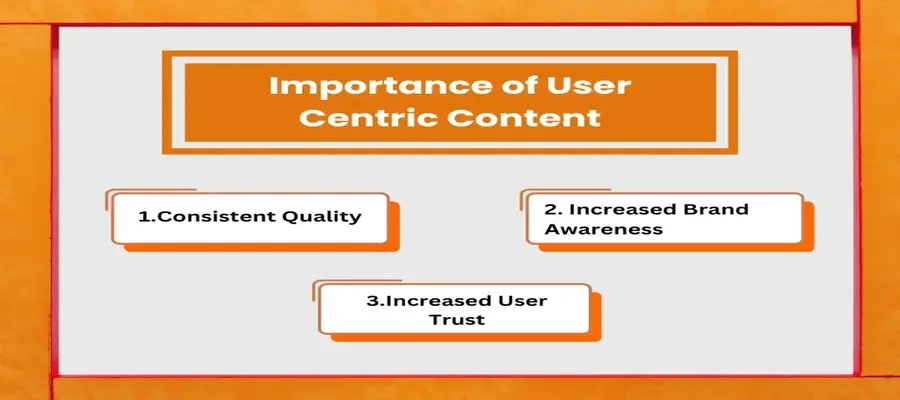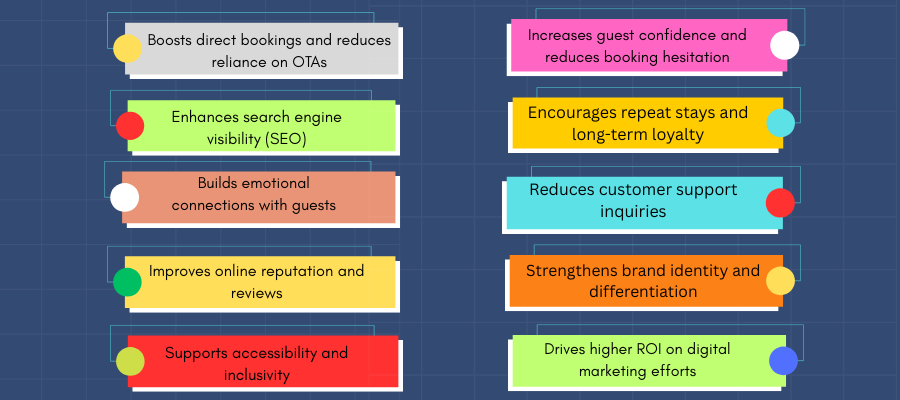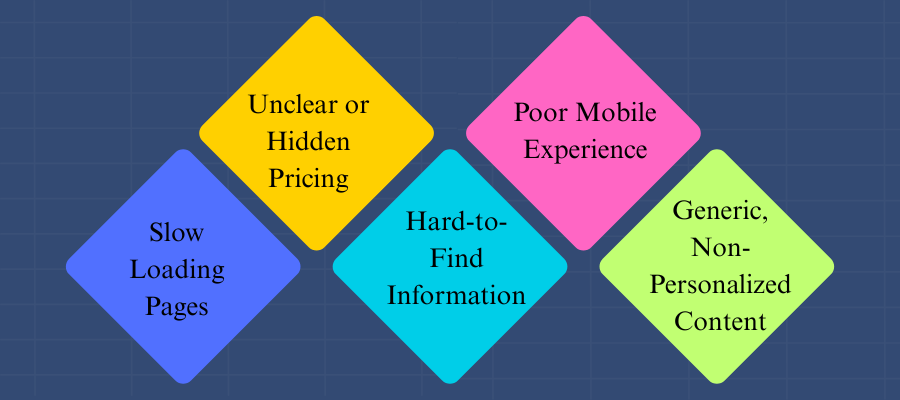Why User-Centric Content Matters for Hospitality Websites
Summary: User-centric content helps hospitality websites attract and convert more guests by focusing on real needs, expectations, and behaviors. From showcasing authentic guest experiences to offering local insights and mobile-friendly navigation, this approach builds trust and improves engagement. Hospitality brands that create content aligned with the guest journey see higher conversions, stronger loyalty, and more direct bookings in a highly competitive digital landscape.
Key Takeaways:
- User-centric content improves engagement and builds guest trust.
- Authentic experiences drive more bookings than generic hotel descriptions.
- Real guest reviews increase credibility and conversion rates.
- Personalized content meets traveler expectations more effectively.
- Hospitality brands need content that reflects the full guest journey.
The hospitality sector faces a critical challenge: many hotel and resort websites still offer generic, uninspiring content that fails to connect with today’s savvy travelers. User‑centric content rooted in real guest experiences, local insights, and mobile‑first presentation transforms your website into a trusted resource. Research shows that sites featuring authentic user-generated content deliver a 29% boost in conversion rates compared to those without. By showcasing genuine reviews, vivid visuals, and stories that resonate, you not only engage visitors more deeply but also inspire confidence to book directly. In 2025’s competitive landscape, hospitality brands that personalize content around the guest journey will stand out, attract more qualified leads, and achieve measurable growth making user‑centric content not just effective, but essential.
Table of Contents
ToggleWhat is User-Centric Content?

User-centric content in the hospitality industry refers to digital content that is carefully crafted to prioritize the needs, expectations, and behaviors of potential guests rather than simply showcasing hotel features. It focuses on answering real traveler questions, offering relevant local insights, and guiding users smoothly toward booking decisions.
Instead of generic descriptions, user-centric content highlights what truly matters to your audience: What does the room actually look like? Is the Wi-Fi reliable for remote work? What unique experiences are available nearby? By providing this level of detail through clear messaging, authentic visuals, and interactive tools like 360° room tours or real-time chat support, you build trust and reduce friction in the decision-making process.
In hospitality, this type of content often includes mobile-optimized pages, personalized recommendations, guest reviews, FAQs, dining options, and neighborhood attractions all presented in a way that’s easy to digest. It creates a digital journey that feels seamless, engaging, and tailored.
Ultimately, user-centric content helps transform casual browsers into confident bookers. By putting the guest at the center of your digital strategy, you not only enhance their online experience but also boost your direct bookings, brand loyalty, and long-term growth.
Why It’s Essential for Hospitality Websites

In the competitive hospitality industry, your website must do more than showcase your property—it must guide, engage, and convert visitors into guests. User-centric content ensures that every visitor finds relevant, clear, and persuasive information quickly. It creates a seamless digital experience that builds trust and drives bookings. By aligning your content with what users truly care about, hospitality brands can improve performance, reduce bounce rates, and deliver the kind of online experience today’s travelers expect.
- Enhances user experience and navigation: User-centric content simplifies the browsing experience by offering intuitive structure, clear headings, and relevant information exactly where users expect to find it. This reduces confusion, frustration, and unnecessary clicks. When travelers can easily navigate your site, compare options, and find essential details quickly, they’re far more likely to stay engaged and continue along the path to booking.
- Increases direct booking conversions: When content speaks directly to the needs and emotions of potential guests, it builds confidence in their decision-making. Clear calls-to-action, persuasive copy, and detailed room descriptions help eliminate doubts and reduce the need for third-party booking platforms. By making the booking process seamless and user-friendly, your site becomes a trusted destination for direct reservations—boosting your revenue and reducing commission costs.
- Builds trust and credibility: Content that’s honest, informative, and up-to-date signals professionalism and transparency. Detailed policies, high-quality images, real guest reviews, and helpful FAQs all help users feel secure in their decision. Trust begins with how you communicate online. When your website reflects reliability and care, visitors are more likely to book confidently—and even recommend your property to others.
- Improves mobile usability: A user-centric approach ensures your content is optimized for smaller screens, fast load times, and easy navigation. Since many travelers browse and book accommodations from their phones, mobile-friendly design is critical. Content should be scannable, buttons should be tap-friendly, and vital information must be accessible without zooming or endless scrolling. This improves the mobile experience and captures on-the-go users.
- Supports SEO and higher rankings: Search engines reward websites that prioritize user experience. User-centric content—structured with headings, keywords, and answers to common questions—helps improve visibility in search results. It increases relevance, reduces bounce rates, and encourages longer site sessions, all of which signal value to Google. As a result, your hospitality website ranks higher and attracts more organic traffic from potential guests.
- Reduces bounce and exit rates: When users land on a page that immediately meets their expectations, they’re more likely to stay and explore. User-centric content anticipates user intent and provides relevant information without forcing them to dig. This minimizes frustration, reduces the urge to leave the site, and helps guide them further down the booking funnel. A lower bounce rate signals strong engagement and value.
- Encourages longer site engagement: Well-structured, user-focused content encourages users to explore more pages, read more details, and interact with booking tools or virtual tours. This increased time on site builds familiarity with your brand and increases the chances of conversion. From dining menus to nearby attractions, user-centric content invites guests to imagine their full experience, making your site both informative and emotionally compelling.
- Answers guest questions before they ask: User-centric content anticipates the concerns, curiosities, and logistical needs of travelers. Whether it’s pet policies, parking availability, Wi-Fi access, or late check-in options, providing answers proactively builds trust and saves your users time. It also reduces inquiries to your staff. When guests feel understood and informed, they’re far more likely to book—and feel satisfied with their choice.
- Personalizes the user journey: User-centric content can be tailored to different traveler types—families, couples, solo adventurers, or business guests. By showcasing relevant packages, amenities, and recommendations, your website makes each visitor feel seen and valued. When users feel like the content “gets them,” it creates an emotional connection. Personalization fosters a sense of belonging and drives faster, more confident booking decisions.
- Strengthens brand loyalty and satisfaction: When guests enjoy their digital experience, they’re more likely to return. User-centric content creates positive first impressions and sets accurate expectations, reducing surprises during their stay. This leads to better reviews, higher satisfaction, and repeat visits. Consistently delivering helpful, thoughtful content strengthens your brand identity and turns one-time visitors into loyal ambassadors who share and recommend your hospitality experience.
Benefits of User-Centric Content for Hospitality Brands

Creating content that puts users first isn’t just good practice—it delivers measurable business results. Hospitality brands that focus on user-centric content see stronger engagement, higher booking rates, and more satisfied guests. It improves the overall digital experience, builds trust, and supports long-term brand growth. From attracting new visitors to converting them into loyal guests, user-focused content turns your website into a powerful marketing and revenue-driving tool.
- Boosts direct bookings and reduces reliance on OTAs: User-centric content streamlines the booking experience by providing clear, relevant information directly on your site. This reduces the need for guests to book through third-party platforms, increasing your profit margins and control over the guest relationship while encouraging direct communication and brand loyalty.
- Enhances search engine visibility (SEO): By addressing common user queries and structuring content around real search intent, user-centric content helps your site rank higher in search engine results. Better visibility means more organic traffic, attracting travelers actively searching for services you offer and reducing dependence on paid advertising.
- Builds emotional connections with guests: User-focused storytelling, personalized messaging, and visual experiences allow potential guests to emotionally connect with your brand. When users feel seen and understood, they’re more likely to choose your property because it resonates with their values, lifestyle, and travel aspirations.
- Improves online reputation and reviews: Accurate, helpful, and transparent content sets the right expectations. When guests know exactly what to expect, they’re more likely to have positive experiences and leave favorable reviews. This strengthens your online reputation and encourages future travelers to book with confidence.
- Supports accessibility and inclusivity: User-centric content considers all types of travellers, including those with disabilities or specific needs. By offering accessible language, features, and information, your website becomes more inclusive, helping you reach a broader audience and demonstrating your commitment to hospitality for all.
- Increases guest confidence and reduces booking hesitation: When guests find answers quickly and content that feels trustworthy, they’re more likely to move forward with a booking. Clear details about pricing, amenities, and policies reduce uncertainty, making guests feel confident and ready to take the next step.
- Encourages repeat stays and long-term loyalty: User-centric content builds a memorable experience from the first digital touchpoint. When guests feel understood and well-served online, it lays the foundation for repeat visits. A consistent, helpful content experience builds trust that carries through every stage of the customer lifecycle.
- Reduces customer support inquiries: By proactively addressing common questions like check-in times, pet policies, or parking—on your website, you reduce the number of support calls and emails. This saves time for your staff and provides faster, more satisfying answers for your guests.
- Strengthens brand identity and differentiation: Content tailored to your target audience allows your hospitality brand to stand out. When your messaging reflects your property’s personality and values, it creates a clear identity that resonates with the right travelers and sets you apart from competitors.
- Drives higher ROI on digital marketing efforts: User-centric content boosts the performance of all your digital marketing campaigns, SEO, social media, and PPC by increasing engagement and conversion rates. Every dollar spent brings greater returns because your content aligns with what users actually want and need at each stage of their journey.
Common Pain Points on Hospitality Websites

Many hospitality websites lose potential guests due to frustrating user experiences and poorly structured content. Common issues include cluttered layouts, unclear pricing, slow load times, and lack of mobile optimization. Users often struggle to find basic information like room amenities, policies, or booking details. Generic content that fails to address specific guest needs only adds to the problem. These friction points not only reduce engagement and trust but also increase bounce rates and missed booking opportunities.
- Unclear or Hidden Pricing: When pricing isn’t clearly displayed or extra charges appear late in the booking process, users lose trust. Lack of transparency creates frustration and leads guests to abandon bookings or look elsewhere. Hospitality websites must present full pricing upfront to build confidence and improve conversion rates.
- Poor Mobile Experience: Many users browse and book on mobile devices, so poor mobile optimization is a major barrier. Unresponsive layouts, hard-to-read text, and difficult navigation drive users away. A mobile-friendly design ensures guests can easily access content and book anytime, anywhere, making it essential for modern hospitality websites.
- Slow Loading Pages: Heavy image files, unnecessary animations, or overloaded scripts can slow down page speed, especially on mobile. Guests won’t wait for slow sites. they’ll leave. Fast-loading pages create a smooth browsing experience, reduce bounce rates, and keep users engaged, which directly impacts your site’s booking performance.
- Hard-to-Find Information: If users must dig through menus or scroll endlessly to find key info like check-in times, Wi-Fi details, or parking—they’ll quickly lose interest. Hospitality websites should surface essential details early and clearly, guiding guests smoothly toward booking without confusion or extra clicks.
- Generic, Non-Personalized Content: One-size-fits-all messaging often falls flat. Whether a guest is a family, solo traveler, or business visitor, they want content that speaks to their unique needs. When websites lack tailored experiences, they miss opportunities to emotionally connect and convert visitors into bookings.
Agha DigiTech’s Approach to User-Centric Hospitality Content
At Agha DigiTech, we believe great hospitality begins online. Our user-centric approach focuses on crafting content that not only informs but also inspires and converts. We start by understanding your target audience—their travel behaviors, expectations, and booking habits. With this insight, we create content that answers their questions, anticipates their needs, and guides them effortlessly through their booking journey.
From clear room descriptions and compelling headlines to localized landing pages and engaging visuals, every element is designed to deliver value and drive action. We ensure your website is mobile-optimized, easy to navigate, and aligned with search engine best practices to attract more qualified traffic.
Beyond just writing, we structure content for clarity, scanability, and emotional impact—turning browsing into booking. Whether you’re a boutique hotel, luxury resort, or short-stay property, we customize your content to reflect your brand voice and guest experience.
Our goal is simple: to make your hospitality website a powerful extension of your guest service, starting with content that connects, converts, and builds loyalty.
Conclusion
User-centric content is no longer optional for hospitality businesses it’s a necessity. Guests expect content that’s relevant, engaging, and personalized to their journey. From showcasing real experiences to guiding users seamlessly to booking, effective content builds trust and drives results.
Agha DigiTech specializes in crafting creative, conversion-focused content tailored for hotels, resorts, and the broader hospitality industry. Whether you’re launching a new website or revamping an old one, we help you connect with your audience through content that speaks their language.
Get in touch with Agha DigiTech today and discover how user-centric content can elevate your brand and increase bookings.
Frequently Asked Question (FAQ's)
What's the impact of UGC on booking decisions?
UGC has a direct impact on booking behavior. Studies show that over 90% of travelers check reviews before booking. When hospitality websites showcase real guest photos, testimonials, and experiences, it reduces hesitation, increases trust, and strongly influences decision-making, especially among younger, experience-driven travelers.
How can hotels encourage guests to create UGC?
Hotels can invite guests to share content through branded hashtags, social media contests, or post-stay email follow-ups. Displaying signs or digital prompts at key locations (like lobbies or dining areas) can also encourage sharing. Offering incentives, like discounts or features on your page, can further boost participation.
What results can hotels expect from user-centric content?
User-centric content can lead to longer site visits, increased direct bookings, higher engagement, and better SEO performance. It creates a digital experience that feels personal and trustworthy. Hospitality brands that consistently deliver guest-focused content typically see stronger brand loyalty, better online reputation, and measurable growth in revenue.
Can UGC improve trust and loyalty?
Absolutely. Guests trust content from other travelers more than traditional marketing. Sharing real guest experiences and acknowledging them publicly creates emotional connections. This approach not only enhances credibility but also builds loyalty, as guests feel valued and more likely to return or recommend your property to others.
How can hotels ensure UGC quality?
Quality control is key. Hotels should monitor submissions and curate only high-resolution, brand-aligned content. Encourage guests to post during high-quality moments like sunset dinners or room unveilings. Offer basic content guidelines or prompts to ensure that what’s shared reflects your hotel’s atmosphere, values, and overall guest experience.




